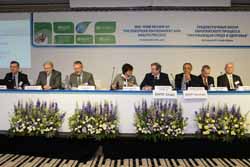Governance

WHO
At the Sixth Ministerial Conference on Environment and Health, held in Ostrava, Czechia in 2017, governments agreed on the future institutional framework of the European Environment and Health Process (EHP). The process continues to be steered by ministers through the governing bodies of WHO and periodical ministerial conferences, to ensure the highest political profile for environment and health issues.
The new institutional framework ensures appropriate coordination and collaboration between national, subnational and international levels, the proper level of monitoring and implementation, and the necessary political drive:
- Effective national mechanisms and structures for the governance of environment and health issues are to be set up or strengthened in countries, to ensure implementation of the commitments made in the Ostrava Declaration.
- The European Environment and Health Task Force (EHTF) is the leading international body for implementation and monitoring of the EHP, meeting annually.
- The EHTF Bureau formulates an intersessional work plan to guide the work of the EHP and steers the preparations for EHTF meetings, including high-level meetings.
- The EHP Secretariat function is provided by WHO/Europe, in close cooperation with UNECE and the United Nations Environment Programme (UNEP).
Between 2010 and 2017, the EHP was governed through a different mechanism, including the European Environment and Health Ministerial Board as the political face of the process.
Up to 2010, the European Environment and Health Committee (EEHC), bringing together representatives from health and environment ministries, and intergovernmental and civil society organizations, monitored and reported on countries’ work to implement their commitments. Its second key role was promotion and advocacy, by sharing experience and best practice and building partnerships with a range of stakeholders.



